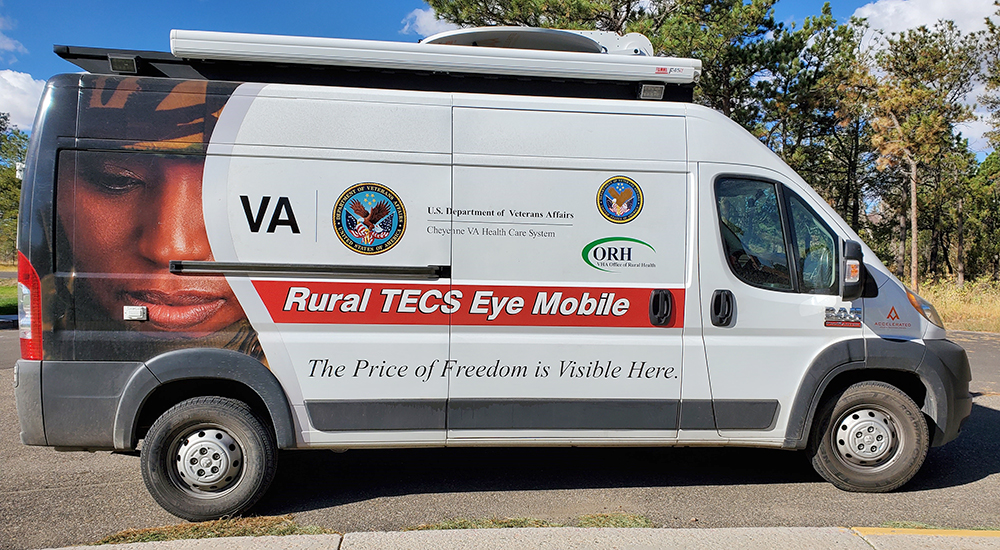In 2015, VA launched the Technology-based Eye Care Services (TECS) program to bring specialty eye care services to underserved Veterans. This telehealth initiative places eye technicians in VA clinics in rural areas to conduct screenings.
They send the results to VA eye care providers for diagnosis and follow-up care. Since its inception, there are now 40 TECS sites across the country.
The Cheyenne VA Medical Center in Wyoming has launched a pilot program to expand mobile eye care access to even more underserved Veterans who live in rural areas.
The team of clinicians at the Cheyenne VAMC included ophthalmologists Dr. Patricia Stepp and Dr. Charles Palmer, TECS Site Director Dr. Regina Gatteau and Cheyenne VAMC Director Paul Roberts.
Cheyenne VA’s outpatient clinics are too small and far apart to include full TECS clinics at each site. And many Veterans must travel several hours to receive care at the clinics. So, the team came up with the idea to put TECS equipment in a van.
Traveled from Wyoming to Louisiana to pick up van
Scott Defreece, rural telehealth nurse manager, and Health Technician Scott Maddison were given the task to find and prepare the van. They found a dormant van in Louisiana used to enroll Veterans in VA care at health fairs.
So, they crossed the country to get the van in February 2020. Maddison used an open station at the local fire department to clean out the van, install TECS equipment and configure it for eye screenings.
Almost as soon as the team completed the van in October 2020, COVID-19 cases spiked in Wyoming. They had to delay the pilot program’s launch. Due to restrictions related to COVID-19, the lead-up to that first screening was a long and bumpy road.
Teamwork made encounter possible
On May 14, VA’s only TECS van traveled to its first patient in Wheatland, Wyoming.
With a successful test encounter under their belts, the team hopes to take the TECS van to other Community Based Outreach Centers. Eventually, they would like to duplicate this initiative in other rural areas.
Dr. Stepp, who was instrumental in carrying this project through the Cheyenne VAMC administration process, even envisions parking TECS vans at Veteran service organization locations and other community centers.
“Their dedication was amazing.”
“We’ve been able to establish a new paradigm for eye care in which a lot of the routine care can be done via telehealth,” Stepp said. “Having a mobile avenue to do this helps bring our care to the Veterans where they need it.”
“A large team was involved in the successful launch,” said Dr. April Maa, the national program lead for TECS. “They persevered through a tough time and their dedication was amazing.”
TECS is not intended to replace in-person eye exams and is one of several options that Veterans can choose for their eye care. To find out if TECS is available for you, contact your VAMC. To learn more about TECS and other programs that deliver increased care and support to Veterans in rural areas, visit the VA Office of Rural Health’s initiatives webpage and the Telehealth TECS intranet page.
Treva Lutes is director of the Office of Connected Care Communications.
Topics in this story
More Stories
As severe weather threatened Mississippi, local news warned of a dangerous outbreak of tornadoes. A VA nurse stepped up.
Dorothy “Pat” Rudd, 103, World War II Navy Veteran, has lived a life of service, pioneering the way for women in the military.
VA employees help return WWII items to two brothers’ families. Both brothers were WWII Veterans.





